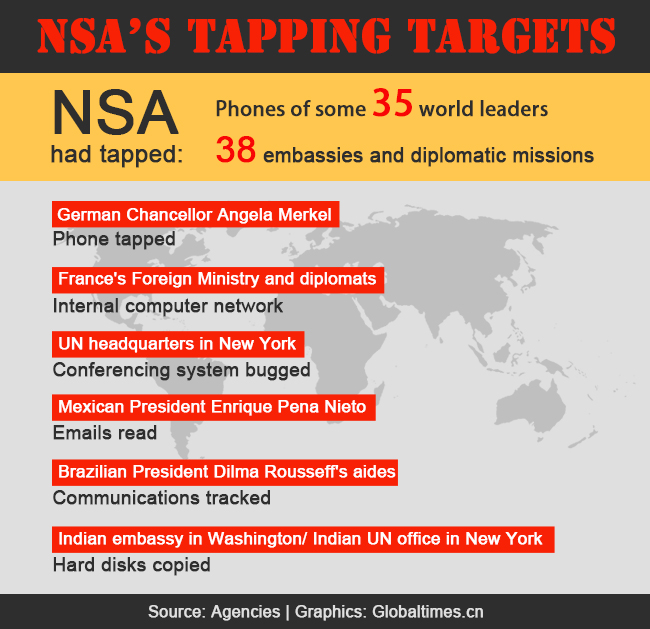HOME >> WORLD
World reacts to NSA spying outposts
Source:Globaltimes.cn Published: 2013-10-30 20:12:00

Demonstrators hold placards and banners to protest against government surveillance in Washington D.C., capital of the United States, on October 26, 2013. Photo: Xinhua
| Latest News |
NSA has 80 listening posts worldwide, including in cities in China
US intelligence has been operating a global network of 80 Special Collection Services (SCS), including Asia listening posts in cities such as Beijing, Shanghai, Chengdu, Hong Kong and Taipei.
| Targeted Objects |

More news
US tracked 60.5 million calls in Spain
Merkel was US snoop target
US spies on 60 million Spanish phone calls in a month, ambassador called to explain
US NSA used bugs to target Indian diplomats
More illegal NSA spying activities leaked
Documents show NSA broke privacy rules
| Intl Reactions |
| US Response |
 Obama looks to ban spying on US allies
Obama looks to ban spying on US alliesUS has made some individual changes in spying practices but so far there was little change in the general policy of snooping on allies.
 US Senate panel to conduct 'major review' of all US intelligence programs
US Senate panel to conduct 'major review' of all US intelligence programsUS Senate Intelligence Committee will initiate "a major review" into all US intelligence programs amid uproar following media disclosures about US spying on world leaders.
 US Senate panel drafting bipartisan bill to limit NSA surveillance
US Senate panel drafting bipartisan bill to limit NSA surveillanceThe US Senate Intelligence Committee began drafting legislation to increase transparency and tighten oversight to NSA's surveillance program.
 US spy agencies hit out at latest Snowden revelations
US spy agencies hit out at latest Snowden revelationsUS spy agencies said the latest media revelations based on leaks from former NSA contractor Edward Snowden will likely damage US and allied intelligence efforts.
| Commentary |
"It is hard to rebuild the trust since the US will unlikely stop eavesdropping. But the US can gain by promising not to spy on major governments and people of Europe."
"Despite these responses made to the allies' outrage, the US is not likely to end its spying operations. Even if it does, it will restart the programs later."
More Op-Ed articles:
US spy scandal puts France in tight spot
Amid troubling spying accusations, Washington needs to address global concerns
Obama's measures over surveillance short of specifics, structural change
| US Spy Projects |
 PRISM
PRISMGives the NSA and FBI access to the systems of nine of the world's top Internet companies, including Google, Facebook, Microsoft, Apple, Yahoo and Skype.
 GENIE
GENIEThe project enabled US computer specialists to break into foreign networks. It has placed "covert implants," sophisticated malware transmitted from far away, in computers, routers and firewalls on tens of thousands of machines every year, with plans to expand those numbers into the millions.
By the end of 2013, the project will take control over 85,000 implanted malwares.
Most targeted countries including China, Iran, Russia and North Korea.
 TURBINE
TURBINEA continuation of GENIE. The new project will help collect information from implanted malware and initiate attacks.
Source: Global Times – Agencies
| Related Coverage |
 Special coverage: Edward Snowden
Special coverage: Edward Snowden Web editor: pangqi@globaltimes.com.cn
Posted in: Americas